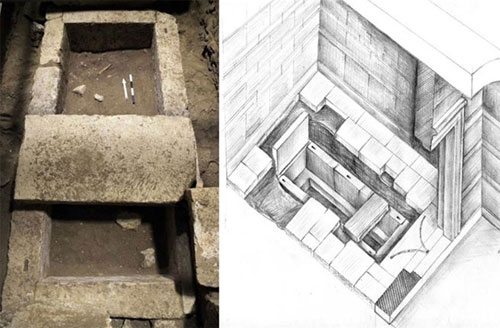Find remains in the mysterious tomb of Alexander the Great
The Greek Ministry of Culture said archaeologists in the country have found a skeleton, in a limestone sarcophagus of the third room in the mysterious tomb located in Amphipolis, dating back to Alexander the Great. (4th century BC).
>>>Discovered two female statues in the Amphipolis tomb area
Authorities said through what is found in this unique tomb, the comedy is likely to belong to 'a powerful character'. Previously, experts believe this tomb is of Roxana, wife of Alexander the Great. Maybe this is the tomb of his mother, Olympias, or one of his generals.
Scientists will definitely conduct research on the above remains. Katerina Peristeri, an archaeologist in charge of the tomb excavation in Amphipolis, said the first analysis results could be published on November 29.

The limestone sarcophagus is beneath the 3rd floor of the old tomb in Amphipolis
In addition to the coffin made from limestone, archaeologists also found the ruins of a wooden coffin along with many broken iron, copper, bone and broken glass.
According to Dorothy King, an archaeologist who participated in the excavation, in fact many parts of the remains were found both inside and outside the limestone sarcophagus. This shows that the tomb has been hacked.
She believes that the grave owner is an extremely important person.'Such a burial person, with the whole body not cremated and buried ashes, is special in the Kingdom of Macedonia,' Ms. King told Discovery News.
King said that if this remains of a man, it is most likely Hephaestion , a close friend and mistress of Alexander the Great.
Hephaestion is an aristocrat and general in ancient Macedonia. He and Alexander the Great have been close since childhood, with the same teacher as Aristotle. When Hephaestion died in Ecbatana (present Hamadan), in western Iran in 324 BC, Alexander showed his friend's mourning by shaving his hair, fasting for days. He even ordered the execution of Hephaestion's doctor and made an expensive pyre for Hephaestion.
There is also a theory that the ancient tomb in the Amphipolis is of Alexander the Great himself. He mysteriously died in Babylon, when he was 32 years old. Legend has it that his body was buried in Alexandria, the city he founded in Egypt. However, so far no one has found his grave in this area.
Reference: Discovery
- The mysterious Alexander tomb
- Found the tomb of Alexander the Great?
- Looking to find Alexander the Great Tomb?
- The remains of Father Alexander the Great have been found
- Excavation of the grave involves Alexander the Great in Greece
- The tombs are the most mysterious in the world
- Discovered two female statues in the Amphipolis tomb area
- Solution to the mysterious 2,000 years of Alexander the Great's death
- New assumptions about the relics of Alexander the Great?
- The lesson from Alexander the last wish
- Discover the mysterious tomb on the island of the refugees
- 56 jars in the tomb of the prime minister of Egypt contain great secrets
 Discovered an ancient centipede fossil 99 million years old
Discovered an ancient centipede fossil 99 million years old Discovered bat-like dinosaurs in China
Discovered bat-like dinosaurs in China Discovered a 200-year-old bronze cannon of the coast
Discovered a 200-year-old bronze cannon of the coast Discover 305 million-year-old spider fossils
Discover 305 million-year-old spider fossils